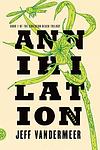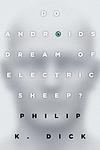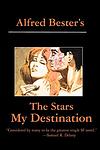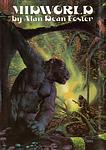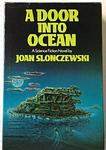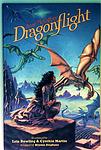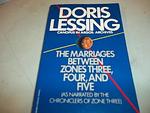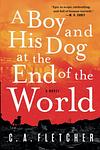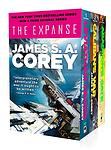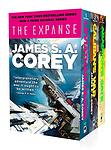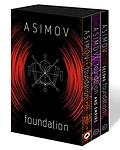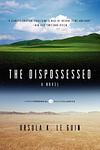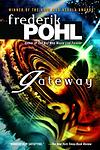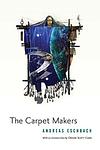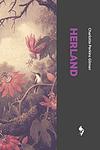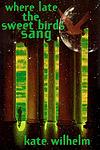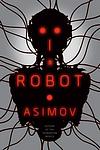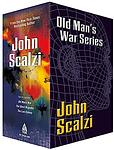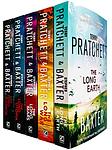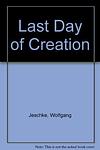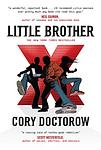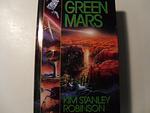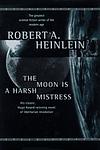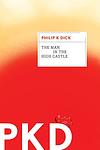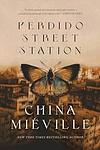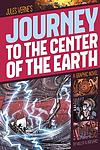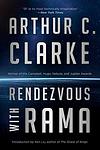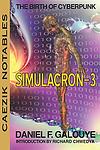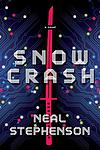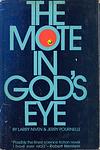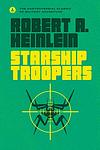The 100 Best Science Fiction Books of All Time
This is one of the 284 lists we use to generate our main The Greatest Books list.
-
City by Clifford D. Simak
"City" by Clifford D. Simak is a collection of interconnected short stories that explore the future of humanity and the evolution of civilization. Set in a distant future where humans have abandoned Earth and left it to robots and intelligent dogs, the book delves into themes of loneliness, the nature of humanity, and the possibility of coexistence between different species. Through a series of thought-provoking narratives, Simak paints a vivid picture of a world where technology and nature intertwine, challenging readers to contemplate the essence of what it means to be human.
-
Andymon by Angela Steinmüller, Karlheinz Steinmüller
This science fiction novel unfolds in a distant future where humanity has spread across the stars, encountering various alien species and civilizations. The story centers on a group of human and alien scientists embarking on a mission to Andymon, a mysterious and seemingly uninhabited planet. As they explore this world, they uncover secrets about an ancient, vanished civilization and face ethical dilemmas about the use of technology, the nature of consciousness, and the value of different forms of life. The narrative delves into themes of exploration, the consequences of colonialism, and the quest for understanding across cultural and species divides, all while presenting a richly imagined universe filled with intriguing characters and speculative scientific ideas.
-
On Two Planets by Kurd Laßwitz
This classic science fiction novel explores the first contact between humans and the inhabitants of Mars, presenting a vision of a technologically advanced Martian civilization that has achieved a harmonious balance between technology, nature, and society. When a German expedition to the North Pole accidentally discovers a Martian colony on Earth, it sets off a series of events that lead to mutual curiosity, cultural exchanges, and misunderstandings between the two species. The narrative delves into themes of ethics, politics, and the potential for peaceful coexistence between vastly different cultures, offering a hopeful yet complex view of interplanetary relations. Through its imaginative depiction of Martian society and technology, the novel raises questions about human progress, environmental stewardship, and the universal values that might bridge worlds.
-
Annihilation by Jeff VanderMeer
In the novel, a team of four women—an anthropologist, a surveyor, a psychologist, and a biologist—embark on an expedition into Area X, a mysterious and remote region cut off from civilization. The area is known for its strange occurrences and the disappearance of previous expedition members. As the team delves deeper into the wild and enigmatic landscape, they encounter bizarre creatures, cryptic signs, and the remnants of a lost civilization. The biologist, serving as the narrator, documents their discoveries and her own personal transformations, driven by the unseen forces of Area X. The novel explores themes of nature, mutation, and the unknown, as the expedition's members confront the limits of knowledge and the consequences of seeking to uncover the inexplicable.
-
Consider Phlebas by Iain Banks
"Consider Phlebas" is a science fiction novel set in a vast and chaotic universe where different civilizations and species clash. The story follows a protagonist named Bora Horza Gobuchul, a shape-shifting mercenary who becomes entangled in a dangerous mission to retrieve a powerful artifact from a religious cult. As Horza navigates treacherous alliances and battles, he also grapples with questions of identity, loyalty, and the nature of humanity. With its epic scope and thought-provoking themes, the novel explores the complexities of war, morality, and the search for meaning in a universe teetering on the brink of destruction.
-
Binti by Nnedi Okorafor
"Binti" is a science fiction novella that follows the journey of a young Himba girl named Binti, who defies her family's wishes and leaves her home to attend the prestigious Oomza University. As the first of her people to be accepted, Binti faces various challenges and cultural clashes as she navigates the complexities of interstellar travel and encounters an alien race known as the Meduse. Through her unique abilities and determination, Binti becomes a bridge between two civilizations, ultimately transforming her own identity and challenging societal norms.
-
Do Androids Dream of Electric Sheep? by Philip K. Dick
Set in a post-apocalyptic world, the novel presents a future where Earth's life has been greatly damaged by a nuclear global war, leaving most species extinct. The remaining human population has been encouraged to emigrate to off-world colonies to preserve the human race. Those who remain on Earth are tasked with maintaining the ecological balance by owning and caring for animals, replacing extinct species with mechanical replicas when necessary. The story revolves around a bounty hunter, who is tasked with "retiring" rogue androids that pose a threat to humans, and his emotional and moral struggles as he goes about his work.
-
Flowers for Algernon by Daniel Keyes
The book is a poignant science fiction narrative that follows the life of Charlie Gordon, a man with an IQ of 68, who undergoes an experimental surgical procedure intended to increase his intelligence. The story is told through Charlie's progress reports, which initially showcase his limited comprehension and writing ability. As the treatment takes effect, Charlie's intelligence surpasses that of the average person, leading to a dramatic increase in his understanding of the world, relationships, and his own past. However, the transformation is not without its pitfalls, as Charlie grapples with the emotional and social implications of his newfound abilities, and the impermanence of the experiment's success becomes a haunting reality. The novel explores themes of intellect, human dignity, and the ethics of scientific experimentation.
-
The Stars My Destination by Alfred Bester
In a future where teleportation is possible, Gully Foyle, a lowly spaceship crew member, survives a catastrophic accident and is left stranded in space. Driven by a burning desire for revenge against those who abandoned him, he undergoes a physical and mental transformation, becoming a force to be reckoned with. As he navigates a world filled with political intrigue, powerful corporations, and mysterious psychic abilities, Gully's journey becomes a thrilling exploration of identity, revenge, and the power of the human spirit.
-
Commander Perkins by H. G. Francis
This science fiction adventure follows the thrilling escapades of Commander Perkins, who, alongside his crew, embarks on a daring journey through space and time. Utilizing the remarkable capabilities of the spaceship "Starshine," they navigate through various dimensions, encountering alien civilizations and confronting perilous challenges. Their mission is not only to explore the unknown reaches of the universe but also to prevent a catastrophic event that threatens the very fabric of time and space. Through teamwork, courage, and ingenuity, Commander Perkins and his team strive to maintain peace and order across the cosmos, showcasing the enduring spirit of exploration and the boundless possibilities of interstellar adventure.
-
Contact by Carl Sagan
The book is a science fiction novel that explores the concept of human contact with extraterrestrial life. The protagonist, a scientist, deciphers a radio signal from a distant star system that contains plans for a complex machine. After building and entering the machine, she and her team are transported to a distant star system where they meet an alien species. The novel delves into philosophical discussions about religion, science, and the nature of human existence.
-
River Of Gods by Ian McDonald
Set in a futuristic India on the brink of its centennial independence celebration, this novel weaves together the lives of nine characters against a backdrop of a nation strained by water shortages and political unrest. As artificial intelligences known as "aeais" push the boundaries of their programming, a renegade scientist discovers a potentially earth-shattering entity in space, and political intrigue threatens to unravel the fabric of society. The narrative explores themes of identity, technology's impact on society, and the complexities of power in a world where the lines between human and artificial intelligence blur. Through its richly detailed setting and intricate plot, the book offers a compelling vision of a future shaped by both technological advancements and enduring human challenges.
-
Dawn by Octavia E. Butler
"Dawn" is a thought-provoking science fiction novel that explores themes of identity, power, and humanity's capacity for change. Set in a post-apocalyptic world, the story follows Lilith Iyapo, a woman who wakes up after centuries of being in suspended animation to find herself among an alien race called the Oankali. The Oankali offer to help humanity rebuild, but their assistance comes at a cost: interbreeding with them to create a new hybrid species. As Lilith navigates the complex dynamics of her new reality, she must confront her own fears and prejudices while grappling with the moral implications of the choices she faces.
-
Dangerous Visions by Harlan Ellison
"Dangerous Visions" is a groundbreaking science fiction anthology that challenges societal norms and pushes the boundaries of the genre. Through a collection of thought-provoking and controversial stories, the book explores themes of power, sexuality, and humanity's relationship with technology. With contributions from renowned authors, it offers a diverse range of perspectives and imaginative narratives that captivate readers and provoke critical thinking about the future of humanity.
-
Midworld by Alan Dean Foster
This science fiction novel is set on a lush, exotic planet covered by a dense rainforest, where the native inhabitants live in harmony with their environment. The story follows a young native named Born as he navigates the complexities of his world, Midworld, which is rich in flora and fauna, some of which are sentient. When off-world humans crash land on the planet, Born finds himself in the middle of a conflict that challenges his understanding of his world and its place in the universe. The novel explores themes of environmentalism, colonialism, and the clash between technologically advanced and primitive societies, all while presenting a vividly imagined alien ecosystem.
-
Dhalgren by Samuel R. Delany
The novel follows the journey of a poet with amnesia, known only as the Kid, through a dystopian city named Bellona. The city has been isolated from the rest of the world following a catastrophic event of unknown origin. The Kid navigates through a society where time, identity, and reality are all fluid, engaging with various groups of outcasts and explorers. The narrative is marked by its experimental style, incorporating elements of science fiction, surrealism, and metafiction.
-
The Last Flight Of Dr. Ain by James Tiptree Jr.
This science fiction story revolves around the enigmatic Dr. Ain, who embarks on a global journey under the guise of a deadly pandemic. As he travels, his true intentions become clear: he aims to save the planet from the destructive impact of humanity by spreading a virus that targets humans specifically. Through a series of flashbacks and perspectives from those who encounter him, the narrative unfolds, revealing Dr. Ain's profound love for the Earth and his radical approach to conservation. The tale is a poignant exploration of environmentalism, ethics, and the extremes one might go to for the sake of the planet.
-
A Door Into Ocean by Joan Slonczewski
This novel unfolds on the ocean-covered planet of Shora, inhabited by the Sharers, an all-female, pacifist society that lives in harmony with their aquatic environment. Their way of life is threatened when they come into contact with the militaristic, male-dominated world of Valan, which seeks to colonize and exploit Shora. Through the lens of bioengineering, nonviolent resistance, and ecological sustainability, the story explores themes of gender, power, and the clash of cultures. The Sharers, with their profound understanding of life sciences, offer a stark contrast to the Valans' approach to technology and control, setting the stage for a compelling narrative about the possibilities of coexistence and the value of understanding and respecting differences.
-
Dragonflight by Anne McCaffrey
In a world where telepathic dragons and their riders protect the land from the destructive Thread that rains down from the sky, a young woman unexpectedly becomes the new Weyrwoman, bonding with the last queen dragon. As the traditional ways of the past clash with the urgent need to defend their world, she and her enigmatic dragonrider ally must rediscover ancient secrets and take to the skies in a perilous quest to unite the dragonriders and save their planet from annihilation. Their journey is fraught with challenges, both political and personal, as they strive to harness the full power of the dragons and ensure the survival of their way of life.
-
Dragonquest by Anne McCaffrey
In this sequel to the pioneering science fiction-fantasy novel set on the planet Pern, the inhabitants continue to grapple with the deadly threat of Threadfall, a spore that devours all organic material in its path. As the dragonriders, who telepathically bond with dragons to fight Thread, struggle with internal conflicts and the challenge of adapting to new technology, the protagonist seeks to unite the old ways with the new to ensure the survival of their world. Tensions rise between the conservative old-timers and the progressive new generation, leading to political intrigue and a quest for harmony between the dragonriders and the rest of the Pernese society.
-
The White Dragon by Anne McCaffrey
In a world where telepathic dragons and their human riders protect the land from threadlike spores that rain down from the sky, "The White Dragon" follows the young Lord Jaxom and his unique dragon, Ruth. As the smallest and only white dragon on the planet, Ruth's intelligence and ability to travel through time make the duo an extraordinary pair. Jaxom, caught between his noble responsibilities and his bond with Ruth, must navigate political intrigue and ancient traditions as they work together to prove their worth. Their journey is one of self-discovery, as they embrace their unique roles in a society that values conformity, ultimately playing a pivotal role in the survival and evolution of their world.
-
The Three-Body Problem by Cixin Liu
The book is a science fiction novel that intertwines the cultural revolution of China with a complex narrative involving astrophysics, virtual reality, and alien contact. It follows a disillusioned scientist who, after suffering personal tragedy during the Cultural Revolution, sends a message into space, only to receive a response from an alien civilization on the brink of destruction. As the aliens plan their migration to Earth, a secret organization works to facilitate the invasion, while a disparate group of scientists and military personnel attempt to understand and prevent the impending extraterrestrial crisis. The novel grapples with themes of human nature, technological advancement, and the vast, often incomprehensible universe.
-
The Marriages Between Zones Three, Four, And Five by Doris Lessing
This novel is a thought-provoking exploration of the relationships and dynamics between different societal zones, each with its own distinct culture and governance. The narrative focuses on the arranged marriage between Al-Ith, the queen of the matriarchal, peaceful, and artistic Zone Three, and Ben Ata, the king of the patriarchal, warlike, and disciplined Zone Four. Their union, decreed by unseen higher powers, is meant to bring about the integration and mutual understanding between their contrasting worlds. As the story unfolds, it delves into themes of power, love, gender roles, and the potential for personal and societal transformation. Through the challenges and changes that the characters experience, the novel examines the complex interplay between different ways of life and the possibility of harmony amidst diversity.
-
A Boy And His Dog by Harlan Ellison
This narrative unfolds in a post-apocalyptic world, focusing on the bond between a young boy and his telepathic dog. Together, they navigate the desolate and dangerous landscape, scavenging for food and shelter. The dog's ability to communicate and sense danger becomes pivotal for their survival. Their journey explores themes of friendship, loyalty, and the struggle for existence in a devastated world. The story delves into the complexities of their relationship, highlighting the lengths to which they will go to protect each other in a world where humanity is scarce and the moral compass has drastically shifted.
-
Use Of Weapons by Iain Banks
"Use of Weapons" is a gripping science fiction novel that follows the life of a skilled and enigmatic mercenary named Cheradenine Zakalwe. The story alternates between two timelines, exploring Zakalwe's dangerous missions and his troubled past. As the narrative unfolds, secrets are revealed, and the true nature of Zakalwe's character is gradually unveiled, leading to a shocking and thought-provoking conclusion. With its intricate plot, complex characters, and philosophical undertones, this book offers a thrilling and introspective exploration of war, morality, and the human condition.
-
Ender's Game by Orson Scott Card
A young prodigy is enlisted into a military academy in space, where he is trained through complex war games to combat an impending alien invasion. Despite his initial struggles with isolation and manipulation by the academy's leaders, he rises through the ranks due to his strategic genius and leadership skills. The protagonist grapples with the moral implications of war and the cost of his own humanity, as he is groomed to be the Earth's ultimate weapon against the alien threat.
-
Dying Inside by Robert Silverberg
"Dying Inside" by Robert Silverberg is a thought-provoking novel that follows the life of David Selig, a telepath who is gradually losing his extraordinary abilities. As he struggles with the impending loss of his powers, David reflects on his past, his failed relationships, and the isolation that comes with being different from others. Through introspection and self-discovery, he grapples with the question of what it truly means to be alive and human, exploring themes of identity, loneliness, and the fragility of the human condition.
-
Evolution by Stephen Baxter
This science fiction novel explores the epic journey of life on Earth, tracing the path of evolution from the primordial past into the distant future. Through the eyes of various creatures, both real and imagined, the narrative delves into the struggles and triumphs of survival across millions of years. The story weaves together a tapestry of life's resilience and adaptability, highlighting the interconnectedness of all living beings and the relentless drive of evolution. As it spans vast epochs, the book offers a profound reflection on the nature of change, the challenges of existence, and the indomitable spirit of life on our planet.
-
The Forever War by Joe Haldeman
This science fiction novel follows the story of a soldier conscripted to fight in an interstellar war against an alien species known as the Taurans. Due to the time dilation effects of space travel at near-light speeds, the soldier experiences only months of combat, while centuries pass on Earth. Each time he returns from a mission, he finds an unrecognizable society with new technologies and altered social norms. The narrative explores the psychological and emotional impact of war, time displacement, and the soldier's struggle to find a sense of belonging in a constantly changing world. As the conflict drags on through the eons, the soldier begins to question the purpose of the war and the high cost of human life in the face of such temporal vastness.
-
Leviathan Wakes by James S. A. Corey
In a future where humanity has colonized the solar system, tensions rise between Earth, Mars, and the Belt, a region of space where resources are mined. The story follows a weary detective and an idealistic ship's officer who become embroiled in a vast conspiracy after a distress signal from a missing young woman leads them to a derelict spaceship and a potentially lethal alien life form. As the political situation deteriorates, they must navigate through the intricacies of interplanetary intrigue, terrorism, and an impending war, all while trying to prevent the spread of an extraterrestrial virus that threatens all of human civilization.
-
Caliban's War by James S. A. Corey
In the gripping sequel to a science fiction series set in a future where humanity has colonized the solar system, tensions escalate as Earth, Mars, and the Outer Planets Alliance vie for control and resources. The discovery of a mysterious alien protomolecule has already wrought havoc on human civilization, and now, the fragile peace is threatened by new confrontations. When a high-ranking official's daughter goes missing on Ganymede, a soldier, a detective, a politician, and a rogue scientist must unite to unravel a conspiracy that could lead to war and the spread of the alien substance, risking all of human existence. Their journey takes them across the solar system, where they encounter monstrous creations, political intrigue, and questions about what it means to be human.
-
Abaddon's Gate by James S. A. Corey
In this science fiction novel, humanity is faced with a new frontier when a mysterious alien artifact known as the Ring appears near the edge of the solar system. Various factions, including Earth's government, Martian military, and the Outer Planets Alliance, converge on the Ring, each with their own agendas. As tensions rise, a ragtag crew aboard a salvaged warship is thrust into the center of potential conflict. With the artifact acting as a gateway to unknown parts of the universe, the crew must navigate political intrigue, personal vendettas, and the very real possibility of first contact with an alien intelligence, all while trying to prevent an interstellar war that could end humanity's future before it has a chance to begin.
-
Cibola Burn by James S. A. Corey
In this science fiction novel, the fourth installment of its series, humanity ventures through the alien gate to a new world, Ilus, where settlers and a corporation clash over the planet's resources. As tensions escalate into violence, a team from an aging ship is sent to mediate the conflict, only to face unforeseen alien technologies and a looming biological catastrophe. The crew must navigate the political turmoil, prevent a war, and survive the deadly alien artifacts, all while dealing with the personal demons that haunt them and the broader implications for human expansion into the universe.
-
Nemesis Games by James S. A. Corey
In this science fiction thriller, the crew of the Rocinante splits up to address personal matters, only to be drawn back together by a catastrophic event. As Earth reels from an unprecedented attack and the solar system's power dynamics shift, the crew must navigate treacherous political landscapes and confront their own pasts. With humanity's future hanging in the balance, they are thrust into a conspiracy that could lead to war and the possible destruction of the human race, pushing them to their limits as they fight to prevent calamity.
-
Babylon's Ashes by James S. A. Corey
In the science fiction saga, the aftermath of a catastrophic interplanetary war threatens the fragile balance of power among the various factions of humanity spread across the solar system. The book follows the crew of a rogue ship as they navigate the political turmoil and confront the radical faction responsible for using an alien technology to hurl asteroids at Earth, causing massive devastation. As the crew seeks to unify the divided human colonies and prevent further chaos, they must also deal with personal demons and shifting alliances. The narrative weaves together the perspectives of diverse characters, each grappling with the consequences of the conflict and the need for cooperation to ensure the survival of the human species amidst the ruins of the once-great civilizations of Earth and Mars.
-
Persepolis Rising by James S. A. Corey
In the science fiction novel set in a distant future where humanity has colonized the solar system, an aging crew of a well-known ship faces a new authoritarian threat emerging from the shadows of the past. Thirty years after their last major conflict, the crew must come to terms with their own mortality and the evolution of their relationships while confronting the rise of a militant empire. This empire, armed with advanced technology from an ancient alien civilization, seeks to impose a rigid order on the disparate colonies of humans. The crew must navigate political intrigue, shifting alliances, and the moral complexities of war to protect the fragile balance of power and prevent the solar system from plunging into tyranny.
-
Tiamat's Wrath by James S. A. Corey
In this science fiction epic, humanity is embroiled in an interstellar conflict with an authoritarian regime seeking to control ancient alien technology. The story follows a band of renegade heroes who struggle against the oppressive Laconian Empire, which has harnessed the power of the mysterious protomolecule to assert its dominance over the human colonies. As the empire faces an unforeseen threat from the alien entities that created the protomolecule, the protagonists must navigate political intrigue, personal loss, and the complexities of human and alien morality to protect humanity's future and unravel the secrets of the universe itself.
-
Leviathan Falls by James S. A. Corey
In the epic conclusion to a sweeping space saga, humanity faces its greatest challenge as factions within the solar system struggle for power amidst the looming threat of an ancient alien empire. As the fabric of reality itself begins to unravel, the crew of a storied ship must navigate political intrigue, personal demons, and cosmic mysteries to prevent the annihilation of human civilization. With the fate of countless worlds hanging in the balance, alliances are tested, sacrifices are made, and the very nature of existence is questioned as the series culminates in a dramatic showdown that promises to reshape the future of humanity and the universe beyond.
-
Fahrenheit 451 by Ray Bradbury
In a dystopian future where books are banned and burned by the government to prevent dissenting ideas, a fireman named Guy Montag, whose job is to burn books, begins to question the society he serves. After a series of events, including meeting a free-thinking teenager and witnessing a woman choosing to die with her books, Montag begins to secretly collect and read books, leading to his eventual rebellion against the oppressive regime. The narrative serves as a critique of censorship, conformity, and the dangers of an illiterate society.
-
Frankenstein by Mary Shelley
This classic novel tells the story of a young scientist who creates a grotesque but sentient creature in an unorthodox scientific experiment. The scientist, horrified by his creation, abandons it, leading the creature to seek revenge. The novel explores themes of ambition, responsibility, guilt, and the potential consequences of playing God.
-
Foundation by Isaac Asimov
This science fiction novel centers around Hari Seldon, a mathematician who has developed a branch of mathematics known as psychohistory. With it, he can predict the future on a large scale. Seldon foresees the imminent fall of the Galactic Empire, which encompasses the entire Milky Way, and a dark age lasting 30,000 years before a second great empire arises. To shorten this period of barbarism, he creates two Foundations at opposite ends of the galaxy. The book follows the first few centuries of the Foundation's existence, focusing on the scientists as they develop new technologies and negotiate with neighboring planets.
-
Foundation And Empire by Isaac Asimov
"Foundation And Empire" is a science fiction novel that continues the epic saga of a future Galactic Empire. As the Foundation, a group of scientists and scholars, grows in power and influence, they face a formidable enemy in the form of the Mule, a mutant with mind-controlling abilities. With the fate of the galaxy hanging in the balance, the Foundation must navigate political intrigue, military conflicts, and the enigmatic Seldon Plan to ensure their survival and preserve the knowledge of humanity.
-
Second Foundation by Isaac Asimov
"Second Foundation" by Isaac Asimov is a science fiction novel set in a future galactic empire. The story follows a group of individuals who possess extraordinary mental abilities known as "psychohistory." As the empire crumbles, they work secretly to manipulate events and guide humanity towards a new era of peace. However, a dangerous adversary emerges, threatening to unravel their plans and plunge the galaxy into chaos. The novel delves into themes of power, control, and the unpredictable nature of human behavior.
-
The Time Traveler's Wife by Audrey Niffenegger
The novel tells the story of a man with a genetic disorder that causes him to time travel unpredictably, and his wife, an artist who has to cope with his frequent absences and dangerous experiences. Their love story endures many separations and dangerous experiences due to his condition. The story's central theme is the effects of time travel on their marriage and their passionate love for each other.
-
The Dispossessed by Ursula K. Le Guin
The novel is a profound exploration of two vastly different societies on twin planets, Urras and Anarres. The protagonist is a brilliant physicist from Anarres, a planet with an anarchist society, who travels to Urras, a planet with a capitalist and authoritarian regime. The book explores his struggle to reconcile his anarchist beliefs with the stark realities of a different socio-political system. It's a thought-provoking investigation of human nature, power structures, and the idea of utopia.
-
Stranger in a Strange Land by Robert A. Heinlein
The novel follows the life of Valentine Michael Smith, a human who was raised on Mars and returns to Earth in early adulthood. Smith struggles to understand human culture, norms, and conventions, while also possessing extraordinary psychic abilities. As he navigates Earth society, he begins to question many of its institutions and values, ultimately creating his own religion to pass on the wisdom he gained on Mars. The book explores themes of freedom, self-reliance, and the nature of humanity, and is considered a classic of science fiction literature.
-
The Futurological Congress by Stanislaw Lem
In a dystopian future, the protagonist attends a scientific conference where he is exposed to a new hallucinogenic drug that transports him to a surreal and chaotic world. As he navigates through this bizarre reality, he becomes entangled in a conspiracy involving mind-altering technology, political manipulation, and the struggle for power. This satirical novel explores themes of reality, identity, and the dangers of unchecked technological advancements.
-
Gateway by Frederik Pohl
In this science fiction novel, an impoverished miner discovers an alien space station filled with starships. The ships are preprogrammed by a long-dead alien race, known as the Heechee, to travel to different parts of the universe. The miner becomes a prospector, risking his life to travel on these ships in hopes of finding valuable alien artifacts. However, the trips are incredibly dangerous, as no one knows where the ships are programmed to go or what they will find there. The story is told in a series of flashbacks, as the miner undergoes psychotherapy sessions to deal with the trauma of his experiences.
-
Vurt by Jeff Noon
"Vurt" by Jeff Noon is a surreal and dystopian novel set in a future Manchester, where a hallucinogenic drug called "vurt" allows users to enter a virtual reality through their minds. The story follows Scribble, a young man who becomes obsessed with finding a rare and powerful vurt feather to save his sister, who is trapped in a vurt world. As Scribble navigates through a dangerous and bizarre landscape, he encounters strange creatures, alternate dimensions, and a mysterious group known as the Stash Riders. Blending elements of science fiction, cyberpunk, and urban fantasy, "Vurt" explores themes of addiction, identity, and the blurred lines between reality and fantasy.
-
The Carpet Makers by Andreas Eschbach
This science fiction novel unfolds on a planet where the entire economy and culture revolve around the intricate craft of making carpets from the hair of the craftsmen's wives and daughters. These carpets are highly prized by the galaxy's elite, not just for their beauty but for a mysterious purpose known only to the empire's emperor. The story intricately weaves together the lives of various characters across different planets, revealing the dark secrets behind the carpet-making tradition and the oppressive regime that sustains it. As the narrative progresses, it delves into themes of rebellion, sacrifice, and the quest for freedom, culminating in a revelation that challenges the very foundation of the characters' understanding of their world and their place within the galaxy.
-
Hard-Boiled Wonderland and the End of the World by Haruki Murakami
In this novel, two parallel narratives intertwine, one following a data encryptor in a dystopian, futuristic Tokyo who becomes embroiled in the machinations of a mysterious scientist and his granddaughter, the other set in a surreal, dreamlike town where a man is tasked with reading old dreams from unicorn skulls. As the story progresses, it becomes evident that the two worlds are connected in a profound and unsettling way, leading to a shocking conclusion that explores themes of consciousness, identity, and the nature of reality.
-
Herland by Charlotte Perkins Gilman
"Herland" is a utopian novel that depicts an isolated society composed entirely of women who reproduce via parthenogenesis. The result is an ideal social order, free of war, conflict, and domination. The story is told from the perspective of a male sociologist who, along with two other men, stumbles upon the society. They are initially imprisoned, but as they learn about the society, they are gradually integrated. The novel explores themes of gender, motherhood, and how environment influences behavior and societal structure.
-
Where Late the Sweet Birds Sang by Kate Wilhelm
In a post-apocalyptic world ravaged by environmental collapse and infertility, a surviving community turns to cloning to preserve humanity. As generations of clones are produced, they form a collective consciousness that values conformity over individuality. The story explores the complex relationship between the last of the original humans and their clone descendants, as well as the clones' struggle to understand the concept of individuality. When a clone with unique artistic abilities is born, it challenges the community's rigid structure and raises profound questions about identity, creativity, and the very essence of human nature.
-
Hell Is The Absence Of God by Ted Chiang
This speculative fiction story delves into a world where the existence of God, angels, and the afterlife is undeniable and manifest through frequent, visible miracles and angelic visitations. However, these divine interventions often result in as much harm as they do good, leading to a complex exploration of faith, love, and the pursuit of spiritual clarity. The narrative follows several characters as they navigate personal tragedies and miracles, each seeking understanding and solace in a reality where divine presence is palpable yet inscrutably indifferent. Through their intertwined journeys, the story examines the profound implications of divine evidence on human belief, suffering, and the quest for heavenly ascension or the dread of eternal separation.
-
Hyperion by Dan Simmons
The book is a science fiction narrative that weaves together the tales of seven pilgrims as they journey to the distant world of Hyperion on the eve of interstellar war. Each pilgrim has their own reason for undertaking this pilgrimage to the Shrike, a mysterious and feared creature that resides in the Time Tombs, which are moving backwards through time. As they travel, they share their stories, revealing personal quests, humanity's complex relationship with technology, and the overarching mystery of the Shrike and Hyperion itself. The novel combines elements of space opera with a frame story structure reminiscent of "The Canterbury Tales," exploring themes of love, religion, politics, and art, all set against the backdrop of an impending catastrophe.
-
I, Robot by Isaac Asimov
The book is a collection of nine short stories that revolve around the interaction of humans and robots. The stories are tied together by a framing narrative featuring a reporter interviewing a retiring robopsychologist, Dr. Susan Calvin. The stories explore the three "Laws of Robotics" and how they are interpreted and manipulated by humans and robots. Throughout the stories, the robots often end up behaving in unexpected ways due to their interpretation of these laws, leading to thought-provoking and often ironic outcomes.
-
The Illustrated Man by Ray Bradbury
"The Illustrated Man" is a collection of eighteen science fiction short stories that revolve around the mysterious figure of the illustrated man, whose body is covered in moving tattoos that predict the future. Each story explores themes of technology, humanity, and the consequences of our actions, taking readers on a thought-provoking journey through dystopian worlds, alien encounters, and the depths of human imagination. With vivid imagery and compelling narratives, the book delves into the complexities of human nature and the potential dangers of our own creations.
-
The Island of Doctor Moreau by H. G. Wells
A shipwrecked man finds himself on an isolated island run by a mad scientist who has been conducting disturbing experiments, transforming animals into human-like beings through vivisection. The man must navigate this horrifying new reality while trying to maintain his own humanity and sanity, in a world where the line between beast and man is blurred. The narrative is a chilling exploration of the nature of humanity, the ethics of science, and the dangers of playing God.
-
Children Of Time by Adrian Tchaikovsky
"Children of Time" by Adrian Tchaikovsky is a science fiction novel that explores the evolution of two species, humans and spiders, on different planets. When Earth faces destruction, a group of humans embarks on a mission to terraform a new planet and create a new civilization. However, an experiment involving a virus meant to accelerate the evolution of monkeys goes wrong, leading to the unintended uplift of spiders. The story follows the parallel development of both species, highlighting their struggles, conflicts, and eventual convergence as they vie for dominance in a rapidly changing world.
-
Old Man's War by John Scalzi
In this science fiction novel, elderly citizens of Earth are given a chance to join an interstellar army, trading their decrepit bodies for rejuvenated, genetically enhanced versions to fight in a seemingly endless war across the galaxy. The protagonist, a widower who enlists on his 75th birthday, navigates the complexities of his new existence, including the physical and emotional challenges of being young again, the camaraderie and loss within the ranks, and the ethical quandaries posed by the conflict with various alien species. As he rises through the military's ranks, he confronts the harsh realities of this expansive and deadly cosmic battlefield.
-
War of the Worlds by H. G. Wells
This classic science fiction novel tells the story of a Martian invasion of Earth, as experienced by an unnamed protagonist and his brother. The Martians, who are technologically far superior to humans, cause widespread devastation with their heat-ray weapons and towering tripods. Despite humanity's best efforts to resist, they seem unstoppable. The novel is a commentary on British imperialism and explores themes of human survival and evolution.
-
War with the Newts by Karel Čapek
The novel is a satirical science fiction tale that explores the discovery of a species of intelligent giant newts. When humans realise they can exploit these creatures for economic gain, they are enslaved and used for labor and military purposes. The newts ultimately rebel, leading to a global war. The book serves as a critique of various political, economic and ideological systems, including colonialism, capitalism and fascism.
-
The Long Earth by Stephen Baxter, Terry Pratchett
This novel explores the concept of an infinite series of parallel worlds, each differing slightly from our own Earth, which become accessible to humanity through a simple, homemade device. The story follows the adventures of Joshua Valienté, who is naturally able to step between these worlds without the need for technology, and Lobsang, an artificial intelligence claiming to be the reincarnation of a Tibetan motorcycle repairman. Together, they embark on an epic journey to explore the far reaches of the Long Earth, discovering new forms of life, human settlements that have adapted to these unique environments, and the profound implications of this endless frontier on human society and its future.
-
The Lone Way To A Small, Angry Planet by Becky Chambers
In this character-driven space opera, a diverse crew aboard a tunneling spaceship embarks on a treacherous mission to punch wormholes through the far reaches of the galaxy. As they journey to a distant planet fraught with conflict, the crew members—each with their own unique backgrounds, species, and perspectives—navigate the complexities of their interpersonal relationships, cultural differences, and personal struggles. The narrative delves into themes of friendship, family, and acceptance, painting a vivid picture of life in a vast, multicultural cosmos where the vastness of space is matched only by the depth of individual experiences and the bonds that form in the most unlikely of circumstances.
-
Mockingbird by Walter Tevis
This novel is a dystopian tale set in a future where humans have become dependent on technology to the point of near helplessness, having lost the ability to read, write, or engage in meaningful personal interactions. The story follows a robot named Spofforth, who serves as the dean of New York University and harbors a deep desire to end his immortal existence, and a human named Paul Bentley, who discovers how to read and seeks to share this lost skill with others. Their journeys intersect with that of Mary Lou, a woman who yearns for a deeper understanding of the human condition. Together, they navigate a world filled with apathy and addiction, seeking to rediscover the lost art of human connection and the transformative power of literature.
-
The Last Day Of Creation by Wolfgang Jeschke
In this thought-provoking science fiction novel, a daring and unconventional narrative unfolds, exploring the concept of time travel as a tool for geopolitical advantage. The story delves into an ambitious project initiated by the United States military, aiming to drastically alter the course of history and secure ultimate power by transporting resources from the past. As the narrative progresses, the ethical, moral, and unforeseen consequences of manipulating time are examined, leading to unexpected and profound implications for humanity's understanding of history, destiny, and the very fabric of the universe. This novel masterfully combines scientific speculation with human drama, challenging readers to ponder the limits of human ingenuity and the price of ambition.
-
Love Is The Plan The Plan Is Death by James Tiptree Jr.
This science fiction story delves into the life cycle of an alien species, where instinct and seasonal changes dictate behavior and societal roles. The protagonist, guided by inherited memories and the overwhelming drive to follow the natural order, faces the struggle between embracing these instincts and the desire for individuality and love. Set against a backdrop of a harsh, unforgiving environment, the narrative explores themes of destiny, the cyclical nature of life, and the powerful, often tragic, influence of innate drives on personal relationships and survival. Through this alien lens, the story poignantly reflects on human nature and the universal challenges of adhering to societal expectations versus pursuing personal desires.
-
The Left Hand Of Darkness by Ursula K. Le Guin
The novel is a groundbreaking work of science fiction that explores themes of gender, politics, and identity. Set on a planet called Gethen, where the inhabitants are ambisexual, shifting between male and female, the story follows an envoy from Earth who struggles to understand this alien society. As he navigates the complex political landscape of Gethen, he must also grapple with his own preconceptions about gender and sexuality. The book is a profound exploration of difference, otherness, and what it means to be human.
-
Little Brother by Cory Doctorow
This novel is a gripping tale set in the near future, focusing on a tech-savvy teenager in San Francisco who becomes embroiled in the aftermath of a terrorist attack. As the Department of Homeland Security begins to infringe on personal freedoms in the name of security, the protagonist and his friends use their knowledge of technology and hacking to fight back against the oppressive surveillance state. The story is a powerful exploration of privacy, freedom, and resistance, urging readers to question the balance between security and civil liberties in the digital age.
-
The Martian Chronicles by Ray Bradbury
This science fiction novel is a collection of intertwined short stories that depict the colonization of Mars by humans fleeing from a troubled Earth, and the conflict between aboriginal Martians and the new colonists. The book delves into issues such as nuclear war, racism, and censorship. As the human settlers arrive and begin to shape the Martian landscape to their needs, they face a series of strange and haunting encounters with the Martian civilization, leading to unexpected and often tragic outcomes.
-
The Martian by Andy Weir
A gripping tale of survival and resilience, this book follows the story of an astronaut left stranded on Mars by his crew who believed him dead after a fierce storm. With limited supplies, he must utilize his ingenuity, wit, and spirit to survive and signal to Earth that he is alive. The narrative is a thrilling testament to human willpower and the relentless fight for survival against all odds.
-
Red Mars by Kim Stanley Robinson
The book is a science fiction narrative that chronicles the initial efforts to colonize Mars. It delves into the complex dynamics among the first group of settlers, who come from diverse cultural and scientific backgrounds, as they confront the challenges of terraforming the hostile Martian environment. The story explores themes of ecological transformation, political struggle, and the ethical implications of altering an alien world, while also examining the personal lives and evolving relationships of the colonists. As the settlers work to create a new society on the red planet, their actions set the stage for future generations and the emergence of Mars as a new frontier for humanity.
-
Green Mars by Kim Stanley Robinson
In the sequel to the epic tale of Martian colonization, the narrative continues to follow the struggles and developments of the settlers as they advance their terraforming efforts on the Red Planet. The second installment delves deeper into the political, social, and ecological challenges faced by the burgeoning Martian society. As the planet's surface begins to turn green with the spread of plant life, the colonists grapple with the complexities of creating a new world, dealing with the conflicting interests of Earth's transnational corporations, and the emergence of unique Martian cultural and political identities. The story weaves together the lives of the original colonists and the new generation of Martians, exploring themes of revolution, adaptation, and the human spirit's unyielding quest for a better future.
-
Blue Mars by Kim Stanley Robinson
The novel concludes a trilogy that chronicles the colonization and terraforming of Mars, exploring the complex interactions between politics, science, and ecology in the process. As the Martian society stabilizes after a period of revolution and unrest, the inhabitants of the red planet grapple with the long-term implications of their transformation, both for their own society and their relationship with Earth. The narrative delves into the lives of the colonists who have become the first Martians, addressing themes of longevity, environmental responsibility, and the quest for a sustainable future for humanity across two worlds. With a backdrop of a vividly imagined Martian landscape, the story reflects on the human capacity for adaptation and the ethical dimensions of altering an entire planet's ecosystem.
-
Ancillary Justice by Ann Leckie
The book is a science fiction novel that follows the story of Breq, who was once a powerful starship AI controlling many bodies, but is now trapped in a single human body and driven by a quest for vengeance. Set in a vast interstellar empire where ships and stations are inhabited by ancillary AIs, the narrative explores themes of identity, gender, and colonialism. Breq's journey intertwines with flashbacks to her past experiences as an AI, revealing her complex relationship with a former officer and the events that led to her current mission. As she navigates political intrigue and battles, Breq challenges the empire's rigid structures and seeks to address the injustices within it.
-
Metro 2033 by Dmitri Glukhovsky
This novel is set in a post-apocalyptic Moscow, where the remnants of humanity have taken refuge in the underground metro system after a devastating nuclear war. The story follows Artyom, a young man who embarks on a perilous journey through the dark, mutant-infested tunnels of the metro to seek help against a new, mysterious threat that endangers the fragile existence of the metro's survivors. Along the way, he encounters various factions vying for power and control, confronts his deepest fears, and questions his beliefs and the nature of reality itself. The narrative weaves together themes of survival, hope, and the enduring human spirit in the face of overwhelming darkness.
-
The Moon is a Harsh Mistress by Robert A. Heinlein
In the late 21st century, the moon has become a penal colony where the inhabitants, known as "Loonies", live under harsh conditions and are exploited by the Earth's government. A supercomputer named Mike, a one-armed computer technician named Mannie, and a revolutionary named Wyoming Knott lead an uprising against the Earth's oppressive rule. With Mike's intelligence, Mannie's technical skills, and Wyoming's charisma, they successfully instigate a rebellion, navigating political intrigue, military strategy, and complex human relationships along the way.
-
Stand on Zanzibar by John Brunner
The novel is a dystopian vision of the year 2010, where the world grapples with overpopulation, ecological disasters, and widespread social unrest. It follows a multitude of characters, including a high-level executive and a data analyst, as they navigate a society dominated by multinational corporations and a supercomputer that predicts social trends. The narrative is fragmented, employing a unique style that interweaves different types of texts to reflect the chaotic and information-saturated world it depicts. Themes of eugenics, media saturation, and corporate power are explored in a world that is at once technologically advanced and socially fragmented.
-
Aftermath by Chuck Wendig
"Aftermath" is a science fiction novel set in the Star Wars universe, taking place after the events of "Return of the Jedi." The story explores the chaos and power struggles that ensue following the destruction of the second Death Star and the death of Emperor Palpatine. Through the eyes of a diverse cast of characters, including a former Rebel pilot, a grieving Imperial loyalist, and a streetwise teenager, the narrative delves into the efforts to build a new government and the rise of a new threat that seeks to fill the power vacuum left by the fallen Empire. The novel weaves together personal stories of redemption, survival, and the quest for peace, setting the stage for the new era in the galaxy.
-
Life Debt by Chuck Wendig
This novel continues the thrilling adventures set in the Star Wars universe, following the aftermath of the original trilogy. The story delves into the efforts of the New Republic to secure its fragile hold on the galaxy, facing threats from the remnants of the Empire. Central to the narrative is the ragtag team led by Norra Wexley, tasked with hunting down Imperial war criminals. Their mission takes an unexpected turn when they receive a distress call from Han Solo, leading them on a perilous quest to free the Wookiee homeworld of Kashyyyk from Imperial control. Alongside, the narrative explores the dark schemes of the Empire's remnants, setting the stage for new conflicts and the rise of familiar and new heroes.
-
Empire's End by Chuck Wendig
This novel concludes a thrilling trilogy set in the iconic Star Wars universe, following the aftermath of the original film trilogy. It centers on the final stand of the Galactic Empire, led by the cunning and ruthless Grand Admiral Rae Sloane, against the fledgling New Republic. As the Empire retreats to the remote planet of Jakku, characters from both sides of the conflict, including the intrepid Norra Wexley and her band of Imperial hunters, converge for a climactic showdown. The story weaves together personal vendettas, political intrigue, and the fate of the galaxy, culminating in a battle that sets the stage for the emergence of the First Order.
-
Neuromancer by William Gibson
In this groundbreaking cyberpunk novel, a washed-up computer hacker is hired by a mysterious employer to pull off the ultimate hack. As he navigates a dystopian future filled with artificial intelligence, corporate espionage, and virtual reality, he must confront his own past and the dark realities of the digital world. The narrative explores themes of technology, identity, and consciousness, pushing the boundaries of science fiction literature.
-
The Man in the High Castle by Philip K. Dick
Set in an alternate history where the Axis powers won World War II, this novel explores life in a world where the United States is divided into three parts: the Pacific States of America, controlled by Japan; the Rocky Mountain States, a neutral buffer zone; and the United States of America, controlled by Nazi Germany. The story follows several characters, including a jewelry designer, a trade minister, and a German secret agent, as they navigate this dystopian reality. The narrative is further complicated by the existence of a banned novel that depicts an alternate reality where the Allies won the war, causing characters to question their understanding of reality.
-
Otherland by Tad Williams
This epic science fiction saga unfolds in a near-future world where virtual reality technology has advanced to unprecedented levels, allowing users to immerse themselves in incredibly detailed and lifelike alternate universes. The narrative follows a diverse group of characters as they embark on a perilous journey through these virtual worlds to uncover the dark secrets of the Otherland network, a mysterious and vast cyberspace realm. Their quest is driven by personal motives, ranging from seeking a cure for a comatose child to unraveling the fate of missing persons, but they soon discover that their actions have far-reaching implications, challenging the very nature of reality, consciousness, and the power structures behind the technology.
-
The Hitchhiker's Guide to the Galaxy by Douglas Adams
This comedic science fiction novel follows the intergalactic adventures of an unwitting human, Arthur Dent, who is rescued just before Earth's destruction by his friend Ford Prefect, a researcher for a galactic travel guide. Together, they hitch a ride on a stolen spaceship, encountering a range of bizarre characters, including a depressed robot and a two-headed ex-president of the galaxy. Through a series of satirical and absurd escapades, the book explores themes of existentialism, bureaucracy, and the absurdity of life, all while poking fun at the science fiction genre and offering witty commentary on the human condition.
-
Perdido Street Station by China Mieville
In a sprawling steampunk metropolis teeming with bizarre creatures and arcane technologies, a gifted scientist unwittingly unleashes a nightmare upon the city. When his experiment with a rare caterpillar goes awry, monstrous, dream-eating moths are set loose, preying upon the citizens' minds and plunging the city into terror. As the scientist grapples with the consequences of his actions, a motley group of individuals, including a renegade artist, a wingless bird-man, and other outcasts, come together in a desperate attempt to save their city from the eldritch horrors that now haunt its shadowy streets. Their journey takes them through the city's various layers, from the opulent heights to the grimy depths, revealing the complex tapestry of cultures and conflicts that define this urban labyrinth.
-
Enterprise Stardust by K. H. Scheer
This science fiction narrative embarks on an epic journey with the crew of the spaceship Stardust as they venture into the depths of the universe. Set against a backdrop of interstellar exploration, the story unfolds with the discovery of an alien civilization that challenges humanity's understanding of life and its place in the cosmos. The crew, led by a determined captain, must navigate the complexities of first contact, diplomatic relations, and the potential dangers of the unknown, all while dealing with internal conflicts and the vast, often unforgiving nature of space. This tale is a blend of adventure, the intrigue of new discoveries, and the timeless quest for knowledge and understanding beyond the confines of Earth.
-
Roadside Picnic by Arkady Strugatsky, Boris Strugatsky
"Roadside Picnic" is a science fiction novel set in a post-apocalyptic world where mysterious extraterrestrial visitors have left behind dangerous and enigmatic zones known as "Visitation Zones." These zones are filled with hazardous artifacts that grant strange and unpredictable powers to those who come into contact with them. The story follows Redrick Schuhart, a "stalker" who ventures into the zones to retrieve valuable artifacts while navigating the treacherous landscapes and facing the moral dilemmas that arise from the desperate and corrupt society in which he lives.
-
Journey to the Center of the Earth by Jules Verne
This science fiction novel revolves around a German professor who believes there are volcanic tubes leading to the center of the Earth. He, his nephew, and their guide embark on an adventurous expedition down an Icelandic volcano into the Earth's core. They encounter prehistoric animals, natural disasters, and otherworldly phenomena along their journey. The expedition is both thrilling and dangerous, testing the limits of their courage and survival skills.
-
Rendezvous with Rama by Arthur C. Clarke
In this science fiction classic, humanity encounters an enigmatic alien starship that enters the solar system. Named after the Hindu god, the cylindrical vessel is initially thought to be an asteroid but is soon revealed to be a spacecraft. A team of astronauts is dispatched to intercept and explore the mysterious object, embarking on a high-stakes mission to unlock its secrets. As they journey through the ship's interior, they discover a world of astonishing complexity, artificial landscapes, and advanced technology, all of which challenge their understanding of life and intelligence in the universe. The explorers must race against time to learn as much as possible before the ship, indifferent to their presence, continues on its voyage through the cosmos.
-
The Handmaid's Tale by Margaret Atwood
Set in a dystopian future, this novel presents a society where women are stripped of their rights and are classified into various roles based on their fertility and societal status. The protagonist is a handmaid, a class of women used solely for their reproductive capabilities by the ruling class. The story is a chilling exploration of the extreme end of misogyny, where women are reduced to their biological functions, and a critique of religious fundamentalism.
-
Ringworld by Larry Niven
In this science fiction novel, a motley crew of explorers, including a 200-year-old human, a young woman with lucky genes, a cat-like alien, and a two-headed alien guide, embark on a journey to investigate an artificial ring orbiting a star. This colossal structure, known as the Ringworld, has the surface area of millions of Earths and harbors many mysteries. As the team explores the vast, enigmatic world, they encounter a variety of advanced technologies and alien species, while also grappling with the physics and dangers of the ring's environment. Their mission becomes a struggle for survival and a quest to uncover the origins and purpose of the Ringworld.
-
Brave New World by Aldous Huxley
Set in a dystopian future, the novel explores a society where human beings are genetically bred and pharmaceutically conditioned to serve in a ruling order. The society is divided into five castes, each with its specific roles. The narrative follows a savage who rejects the norms of this new world order and struggles to navigate the clash between the values of his upbringing and the reality of this technologically advanced, emotionless society. His resistance prompts a deep examination of the nature of freedom, individuality, and happiness.
-
Slaughterhouse-Five by Kurt Vonnegut
The novel follows the life of Billy Pilgrim, a World War II veteran who has become "unstuck in time," experiencing his life events out of order. This includes his experiences as a prisoner of war in Dresden during the Allies' firebombing, his post-war life as a successful optometrist, his abduction by aliens from the planet Tralfamadore, and his eventual death. The book is a critique of war and a demonstration of the destructive nature of time, with a nonlinear narrative that reflects the chaos and unpredictability of life.
-
Simulacron 3 by Daniel F. Galouye
This science fiction novel explores the concept of virtual reality and the nature of reality itself, set in a world where a computer simulation, designed to predict consumer trends, evolves into a fully immersive virtual city. The protagonist, a programmer involved with the project, discovers unsettling evidence that his own reality might also be a simulation, leading him on a quest to uncover the truth. As he delves deeper, he faces existential questions and the challenge of distinguishing between the simulated and the real, pushing the boundaries of human perception and technology. The narrative delves into themes of consciousness, identity, and the ethical implications of creating simulated realities.
-
Snow Crash by Neal Stephenson
In a future America where the federal government has largely collapsed and been replaced by corporate entities, a computer hacker and pizza delivery driver becomes embroiled in a plot involving a dangerous new drug and a computer virus called "Snow Crash". He is joined by a teenage skateboard courier and a host of other characters in a high-stakes race to uncover the truth behind the virus and its origins in ancient Sumerian culture. The narrative explores themes of linguistics, philosophy, computer science, religion, and cryptography.
-
Solaris by Stanislaw Lem
The novel is a psychological exploration of human limitations and failures set against the backdrop of space exploration. When a psychologist arrives at a research station orbiting a distant planet covered entirely by a sentient ocean, he discovers the crew in disarray, haunted by physical manifestations of their subconscious fears and desires. As he grapples with the ocean's inscrutable nature and its unsettling ability to materialize human thoughts, he is forced to confront his own guilt and regret, embodied by the apparition of his deceased wife. The story is a philosophical meditation on the impossibility of truly understanding alien intelligence and the painful isolation of the human condition.
-
Spin by Robert Charles Wilson
The novel centers on a mysterious event in which the Earth is encapsulated by an alien barrier that drastically slows down time on the planet's surface compared to the rest of the universe. As stars disappear from the night sky, three childhood friends confront an altered reality where humanity must grapple with its insignificance in the cosmos. The narrative follows their personal journeys and the global response to this existential crisis, exploring themes of time, space, and the human condition, while scientists work fervently to understand and potentially reverse the effects of the time distortion before the outside universe ages eons, leaving Earth far behind.
-
The Mote In God's Eye by Larry Niven, Jerry Pournelle
"The Mote In God's Eye" is a gripping science fiction novel set in the distant future, where humanity has expanded its reach to the stars. When a mysterious alien race, known as the Moties, is discovered, a team of human scientists and diplomats embark on a mission to establish contact and learn more about their civilization. However, as they delve deeper into the Moties' society, they uncover dark secrets and hidden agendas that could have catastrophic consequences for both species. Filled with political intrigue, moral dilemmas, and thought-provoking themes, this book explores the complexities of interstellar relations and the potential dangers of encountering an unknown extraterrestrial civilization.
-
Starship Troopers by Robert A. Heinlein
The book is a military science fiction novel set in the future, where humanity is engaged in an interstellar war against an alien species known as the Arachnids or "Bugs." It follows the story of Juan "Johnny" Rico, a young infantryman in the Mobile Infantry, a futuristic military unit equipped with powered armor suits. The narrative delves into Rico's experiences and growth from a naïve recruit to a seasoned officer, exploring themes of citizenship, duty, and the moral complexities of war. Through Rico's eyes, the novel examines the structure of a militaristic society where full citizenship and the right to vote are earned through military service, presenting a society that values sacrifice and responsibility in a perpetual struggle for survival against a hostile universe.
Tor, 116 Books
This list, "The 100 Best Science Fiction Books of All Time," was curated by the team at Tor Online, a prominent platform for science fiction literature. In an initiative launched last year, they reached out to their audience, calling upon readers to nominate their favorite science fiction novels. The aim was to compile a definitive list that celebrates the richness and diversity of the science fiction genre, spanning its entire history up to the present day. The titles selected do not necessarily represent the most original, successful, challenging, or influential works in the field, acknowledging that such a collection could never be exhaustive or objective. Instead, the list stands as a broad cross-section of science fiction literature, including both timeless classics and notable contemporary works, intended to offer readers a comprehensive and inspiring exploration of the genre. The selection process, detailed by editor Markus Mäurer in a series of articles, underscores the collaborative effort between the editorial team and the genre's enthusiastic readership, making it a unique and representative compilation for enthusiasts and newcomers alike.
Added about 1 month ago.
This list has a weight of 18%. To learn more about what this means please visit the Rankings page.
Here is a list of what is decreasing the importance of this list:
- List: only covers 1 specific genre
- Voters: not critics, authors, or experts, but the books on the list were curated by critics/experts
- List: Creator of the list, sells the books on the list
- Voters: specific voter details are lacking
If you think this is incorrect please e-mail us at [email protected].



